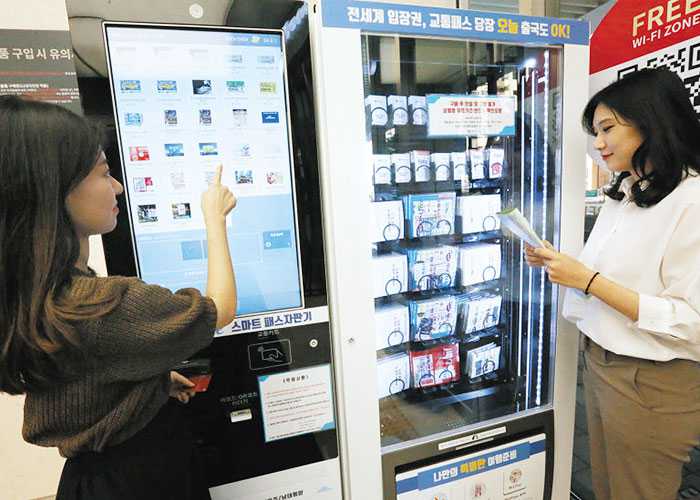The Unstoppable Rise of Vending Machines
18 September, 2018

Vending machines and self-service kiosks are on an unstoppable rise in Korea, and they sell ever more products as dead-end low-paying jobs dwindle and employers claim they can no longer afford the minimum wage.
One new vending machine in the lobby of SM Duty Free store in Insa-dong, downtown Seoul sells 27 products that can be used by travelers to other countries, including Osaka and Tokyo subway tickets and Thai smartphone SIM cards.
The "Smart Pass" vending machine is the brainchild of Hana Tour, designed to appeal to travelers who are heading overseas at a moment's notice.
Gone are the days when vending machines sold nothing but awful instant coffee and bags of sweets.
Women try vending machines at SM Duty Free store in Insa-dong, Seoul on Monday.
Lotte Cinema set up vending machines at its theater in Lotte World Tower early this month that sell the usual popcorn, beverages and other snacks for moviegoers as well as beauty and health products.
"We set up the vending machine so that moviegoers could shop while waiting for their movies to start," a staffer said. "Sales through the vending machines have grown 20 percent."
Coca Cola last month set up a new vending machine at the World Cup Stadium in Sangam-dong, Seoul, allowing customers to take their beverages from PET bottles and turn them into slushes, using cutting-edge freezing technology.
BGF Retail, which runs the CU chain of convenience stores, teamed up with Nonghyup and KT to offer trial runs of a vending machine in Goyang north of Seoul selling meat in small servings designed to appeal to singles.
The 7-Eleven chain of convenience stores already has vending machines with around 200 types of products, while E-Mart 24 began selling packaged meals and other food products via vending machines and plans to expand them to 70 stores across the country.
The machines seem to appeal to perpetually rushed younger people who are embracing automation and can sometimes not be bothered to deal with a checkout clerk.
Kim Nan-do at Seoul National University said, "Smartphones payments have become common, and more and more consumers are opting to buy products without having to interact with other people."
